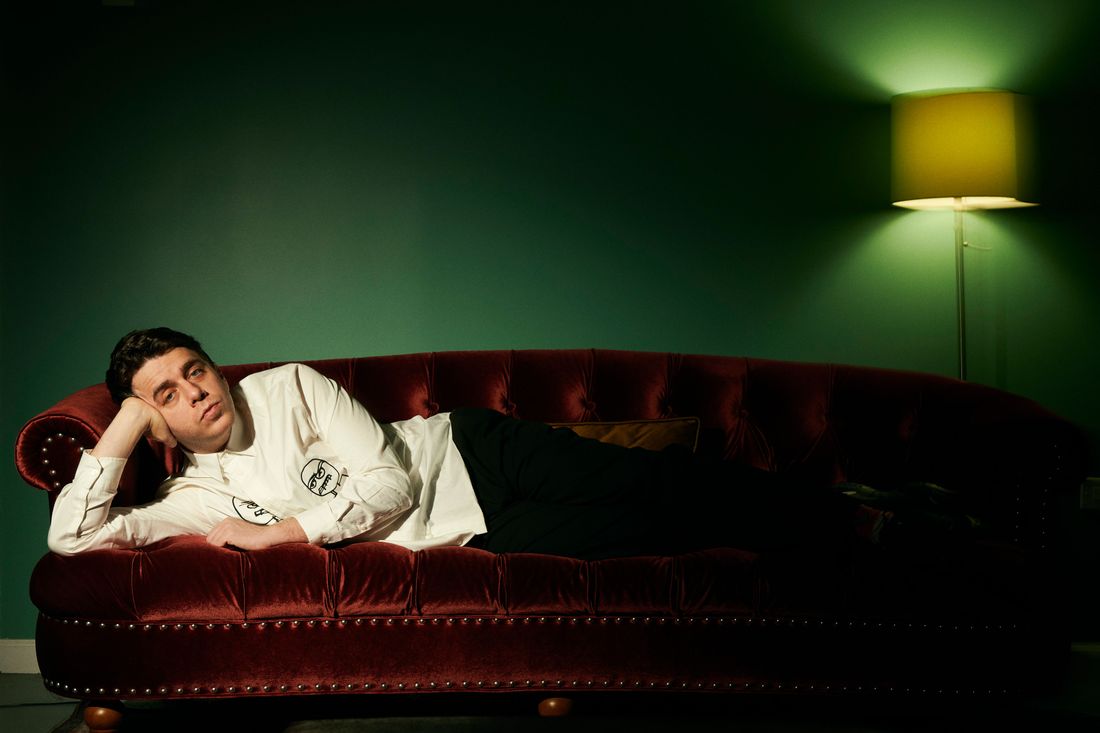
This profile was originally published on January 17, 2024. With the news that Max Wolf Friedlich’s Job is coming to Broadway, we republished it on May 28, 2024.
Max Wolf Friedlich is 29 and so grew up seeing, and sometimes seeking out, all sorts of crazy shit online. Perhaps as a result, he has a certain unbothered, button-pushing bravado. This is true in person, I realize when we meet, a few days into the New Year, for lunch at Shopsin’s, the diner in Essex Market. There, he declares that, even as I make some tepid chitchat about resolutions and minding my carbs, he is still planning to “eat like a little piece of shit” in 2024. But also in his clever, psychologically harrowing play Job, which I couldn’t stop thinking about after I saw it in the fall at the Soho Playhouse (it begins another run at the Connelly Theater in the East Village this month). The show is about a millennial content moderator named Jane who, after having an office breakdown that goes viral, is mandated by her Facebook-esque employer to see a technophobic boomer therapist; upping the drama, she brings a gun along to the session. It’s 80 anxiety-inducing minutes long, and I was so distracted by the final plot twist that I couldn’t hold a conversation with my friends over drinks afterward.
At lunch, just as our food arrives, I ask Friedlich what is the most disturbing thing he’s ever witnessed online. “Sorry, we’re eating,” he says, before admitting that as a kid he was “obsessed” with watching a video of an American journalist being beheaded in the Middle East. “I watched it so many times just being like, Whoa,” he says between big bites of his brisket-and-chorizo sandwich. It is a blithely unaware, or perhaps blithely calculated, thing to say to a journalist.
Friedlich is a gentle, droopy-eyed Manhattan kid who was clearly well supported by his well-off parents. His father, Jim Friedlich, is the CEO of a journalism nonprofit who worked at Dow Jones, and his mother, Melissa Stern, is an artist. They raised him in a Chelsea loft and sent him to school at Friends Seminary, which he describes, side-eyeing his own privilege, as “a good lesson in liberal hypocrisies.” (A line from Job: “Everyone’s racist and we’re all alone. That’s sort of our brand in 2020,” which is the year the play is set; he calls it a “period piece.”)
He was a “chubby and insecure” kid, in his own telling, so his mom sent him to LARP (live-action role-playing) camp to help him come out of his shell. “It’s a very simple psychological trick to play on a child. You can be a warrior. You can choose to be confident,” he explains. “It really worked on me. From there, I started doing theater.”
At 14, he wrote his first play about a glory hole in the back of an upstate dive bar on the opposite side of which was Jesus Christ giving hand jobs. “My eighth-grade English teacher was like, ‘I have to tell your parents because they need to be aware … but this is amazing,’” he remembers, grinning.
At 16, a girl at his after-school playwriting program got into the now-defunct New York International Fringe Festival, and he says he thought, “I’m a much better writer than her.” He submitted a script the next year and was chosen for the festival’s showcase. The play, called SleepOver, was once again rather naughty: It was about two upper-middle-class teens, one white and neurotic (based in part on himself) and the other Black, who end up at the white boy’s Park Slope brownstone for a two-week visit. They spend time precociously holding forth about sex, race, and girls while dropping a lot of F-bombs. The Black friend also sleeps with his host’s mother.
For college, Friedlich followed his father to Wesleyan. After graduating, he moved to Los Angeles, planning on a career in Hollywood. But like so many clever boys who arrived before him (and have since), the town didn’t immediately fall for his youthful charm. “I was so lonely and depressed,” he says, adding that he even took a job as an usher at the Dolby Theatre. “I was showing people to their seats at Enrique Iglesias concerts.”
Instead of writing prestige TV, he got hired by the start-up Brud, famous at the time for creating a cute computer-generated influencer named Lil Miquela. She wasn’t human, or even AI, but she had a sponsorship with Prada and was named one of Time’s “25 Most Influential People on the Internet” in 2018. Friedlich wrote her Instagram captions and monitored her DMs. “The way in which Job is slightly autobiographical is I did have this weird experience of being a famous woman on the internet and having 1 million-something people talking to you at all times,” he says. The job led him to ghostwrite actual human-celebrity social-media accounts, though his NDAs prevent him from saying whose.
In 2018, he met a stressed-out real-life content moderator at a house party and began writing Job the next year. In 2021, after moving back to New York, he entered the script into a competition hosted by Soho Playhouse and it beat out 19 other plays for the prize: the chance to show there for one night only. The playhouse offered him the opportunity to stage the play for five weeks — later extended to eight — instead. Succession’s Peter Friedman played the therapist and Sydney Lemmon, Jane. (Lemmon told me that after reading the script for the first time, she had a stomach-ache for three days: “It stirred something up inside me that’s not easy to digest or think about or talk about.”) They’re both returning for the run at the Connelly.
Job is both a send-up of Silicon Valley (“It’s considered, like … ‘dystopian’ to love your tech job, but anyone who says that hasn’t tasted the alkali waters I’ve tasted,” Jane declares at one point) and a generational death match between an older man, who believes the internet is evil, and a younger woman, who can’t imagine a world without it. As Jane says, “The phone is never the problem. People do bad things, not phones.” It’s the kind of jaded millennial commentary — not wrong, maybe brilliant, maybe cliché — that I realize collapses the distance between Friedlich and his characters.
The play was a New York Times “Critic’s Pick,” but this magazine’s Sara Holdren came away less convinced, calling it “a horror piece — a Black Mirror episode with the sci-fi dialed down (because the horrors are real) and the punchy, cynical, HBO-ready dialogue dialed up.” Julianne Moore came one night, and Hugh Jackman posted about it. Fittingly, the play quickly sold out its run after a TikToker named @moschinodorito hyped it up: “When was the last time you saw a play? Because if you live in New York, holy shit I got one for you.”
As Friedlich puts it, “We’re a hit among teenagers; we’re a hit among NYU people and Dimes Square motherfuckers. What is exciting to me is that young people were excited about the show.”
But he’s not, he insists, trying to moralize about big tech. “I really don’t think in the digital age that theater has the power to, like, change hearts and minds,” he says. “What’s more interesting to me is the base act of getting a bunch of people together.”
That said, there has been some interest in adapting Job for the screen, and he’s not against the idea of selling out a little. “If I could write Transformers 8 and direct a Mitsubishi commercial and do whatever I want theaterwise, that would be great,” he says. But he also thinks it’s possible to get his peers to care about seeing plays as much as they care about streetwear drops. Call it “theater for the boys,” he says, half-kidding. After all, there have been some advantages to appealing to the world he parodies in Job. “Candidly, and to be a pure capitalist about it, it’s a new fundraising network: these people who are very liquid and want to be culturally engaged,” he says. “If the industry is going to survive, we need 30-year-old bros to get onboard thinking this is a cool thing.”


